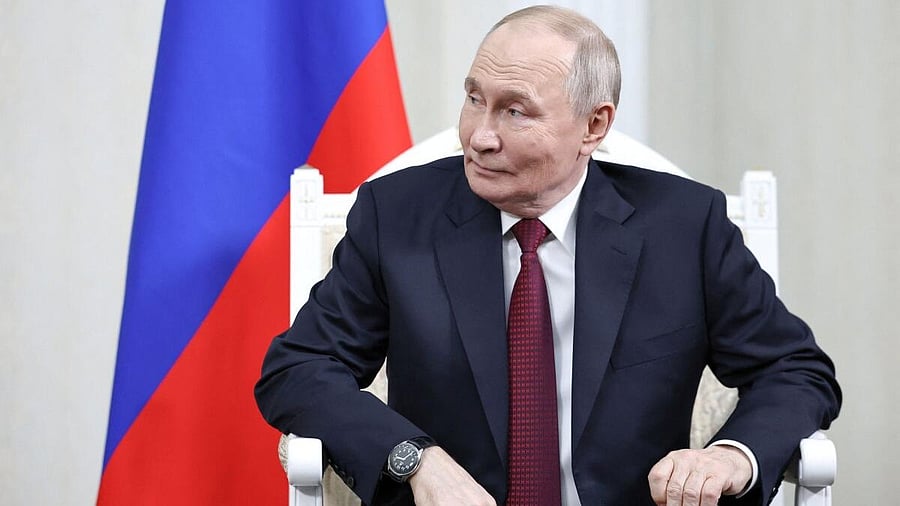
Russian President Vladimir Putin attends a meeting with Belarusian President Alexander Lukashenko in Bishkek, Kyrgyzstan.
Credit: Reuters Photo
Berlin: Ukrainian and European officials exhaled after scrambling to soften President Donald Trump’s surprise Kremlin-friendly peace plan. But an uncomfortable reality looms over the diplomatic frenzy: It will all come down to what Russian President Vladimir Putin is willing to accept.
The Russian leader has signaled that he is prepared to continue fighting the war, despite high battlefield losses and economic pain at home, with the aim of forcing Ukraine to embrace demands that would subordinate the nation to Russia.
The realities on the ground, analysts say, give Putin little reason to temper his terms. Ukraine is relinquishing territory at a quickening pace. It is struggling with a domestic corruption scandal. It is also running low on money and soldiers, as well as losing the patience of the United States.
For the Russian leader, holding out for a broader Ukrainian collapse could deliver even bigger concessions.
“The essence of his war is to weaken Ukraine,” said Tatiana Stanovaya, a senior fellow at the Carnegie Russia Eurasia Center.
As he bombs Ukrainian infrastructure and gradually takes more land, the Russian leader believes he will get what he wants, Stanovaya said, “if not now, then in six months, if not in six months, then in a year.”
Putin may not be a master strategist, as illustrated by his initial vast underestimation of Ukraine’s ability to hold back Russian forces. But he fully understands that he has the upper hand in the war, Stanovaya said.
“Ukraine itself is in an ever-deepening crisis, and sooner or later they’ll break — he knows that clearly, and that’s all,” she said. “He doesn’t need to know anything else.”
Putin has said he wants a binding guarantee that Ukraine will not enter NATO, a pledge that the Western military alliance won’t expand farther eastward, limits on Ukraine’s military strength and special protections for the Russian language and the Russian Orthodox Church in Ukraine, among other demands. Talks in Alaska this summer centered on Putin’s wish to take the entirety of the eastern Ukrainian regions of Donetsk and Luhansk, including parts still held by Ukraine.
In recent days, European officials expressed dismay at points in the plan that would constrain NATO and give Moscow power over European security, persuading U.S. officials to put those matters on a separate negotiating track. Ukraine has pushed for the existing front line to be the starting point for territory talks. It has also questioned proposed caps on its military.
Moscow has dismissed as unproductive European counterproposals that circulated in recent days, and suggested that any plan departing from the fundamental understandings that the United States and Russia reached during the Alaska summit would be a nonstarter.
There are signs that Putin wouldn’t even have agreed to the original 28-point plan that caused an outcry for its Russia tilt when it emerged last week.
The Russian leader said the plan could be a basis for a peace agreement but would still require substantive discussion. His top foreign policy aide, Yuri Ushakov, said many of the positions were acceptable, “but not all.”
The proposal’s caps on Ukraine’s military strength, for instance, were more generous than what Moscow floated in failed talks in 2022. The U.S. plan would place no limits on Ukrainian military hardware. And it called for using frozen Russian sovereign funds in Europe for Ukraine’s reconstruction. All could be sticking points for Putin.
The Kremlin said Trump’s special envoy, Steve Witkoff, would return to Moscow next week to discuss the details. Trump announced the visit on social media and said the U.S. Army secretary, Daniel P. Driscoll, would be meeting with the Ukrainians.
While Putin has said he is willing to continue fighting the war, the Russian leader is also eager to develop a deeper relationship with Trump, which could yield sanctions relief, economic cooperation and broader geostrategic benefits. Analysts say the Russian leader is enticed by that prospect but won’t sacrifice his primary war aims to achieve it.
Russia has also been facing a Ukrainian strike campaign on its oil and military installations, which Trump threatened to bolster this year with the provision of long-range Tomahawk missiles before standing down.
Moscow may be hoping that if the latest round of diplomacy doesn’t result in a peace agreement, it will lead the United States to break off all support for Ukraine, possibly hastening a Ukrainian disintegration.
“Putin still wants it all,” said Max Bergmann, director of the Europe, Russia and Eurasia program at the Center for Strategic and International Studies. “But the main thing he wants is Ukraine in his orbit. And if he can’t have Ukraine, no one can.”
Bergmann noted that similar bursts of diplomacy this year fizzled out.
“In some ways, this is a merry-go-round,” he said. “With every initiative, you get on the merry-go-round, there is a flurry of activity, it looks like you are going somewhere and eventually it stops and you get off in the same place that you were, which is the war just continuing on.”